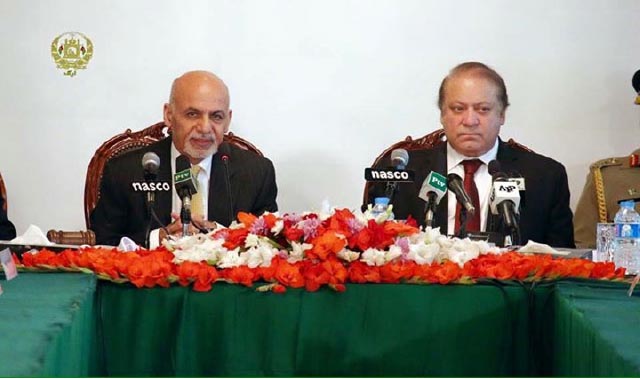The ebb and flow of Afghan-Pak relation continues more than a decade. Pakistan has constantly promised to orchestrate peace talk. A face-to-face negotiation was hosted between Afghan officials and Taliban elements on July 07, 2015 near Islamabad, in Murree. However, the revelation of Mullah Omar’s death and subsequent struggle for succession in the Taliban leadership threw the whole process into uncertainty.
The Taliban’s new leader, Akhtar Mansour, in his first statement since the pronunciation of the supreme leadership of the movement emphasized that the fight would continue. He dismissed talks about peace as “enemies’ propaganda.” Prior to the publication of this speech in audio format on the Taliban website, Mansour had long been seen as one of the most pro-peace and moderate figures in the movement’s leadership. However, he made heavy inroads in Afghanistan in the wake of being appointed as Omar’s successor in order to gain further allegiance from the Taliban’s insurgents.
Since the Taliban insurgents made inroads from across the border, tension between Kabul and Islamabad resurfaced. The Chief Executive Officer Dr. Abdullah Abdullah declared on the 70th United Nations General Assembly meeting in New York that the Haqqani network had been identified as a main culprit and needed to be dismantled as had been Afghanistan demand in the past. “Our demands are legitimate as our people continue to suffer at the hands of terrorist elements who cross into Afghanistan and indiscriminately victimize our citizens. This matter needs be addressed and facilitated by trusted international partners,” Abdullah said. “We call on Pakistan to do what its leadership promised to us a few months ago when they agreed to crack down on known terror outfits – meaning the enemies of Afghanistan.”
Therefore, the rift between the two countries widened and peace process stalled up to now. But in a recent visit to the Unites States, Pakistan’s Army Chief General Raheel Sharif discussed the resumption of peace process. In other words, Pakistan and the United States agreed in November to work together for an early resumption of the stalled Afghan reconciliation process, during Sharif’s visit to the United States where he held extensive discussions with key figures of the Obama administration, including Vice President Joe Biden.
The joint inauguration of “Heart of Asia” conference in Islamabad, which aimed to intensify efforts for regional linkages and to promote peace and stability in Afghanistan, has bridged the long-term gap. Pakistani Prime Minister Nawaz Sharif and Afghan President Muhammad Ashraf Ghani jointly inaugurated the conference attended by Foreign Ministers of several countries. “Afghanistan is the heart of Asia and if there is trouble in the heart, the entire region will be turbulent,” Sharif is cited as saying. “The enemies of Afghanistan are the enemies of Pakistan and the government will continue to support an Afghan-led and Afghan-owned peace process that remains the most viable option to promote stability and end violence,” Sharif added.
Ghani said that Afghanistan has come a long way in building close ties with all its neighbors. He held the “regional and international terror groups” responsible for the violence in the country. He further said, “I have had to become a war president, because an all-out war has been imposed on us. Unfortunately, recent events in Pakistan have forced us to host 350,000 to 500,000 refugees from Pakistan ....”
Afghanistan showed great tendency towards peace long ago and urged Pakistan to nudge the Taliban outfits to sit on the table of negotiation. Similarly, Pakistan officials stressed to broker the peace talk and said that “the enemies of Afghanistan are the enemies of Pakistan”. However, according to Afghan officials, their practices went against their words and failed to prove their statements. Now, the question is that will Pakistan practice what she preaches?
A sense of mistrust, which roots in previous relation that left the nation-state’s ambition unfulfilled, still seems to be in the air. Despite Kabul’s relentless efforts to gain peace and security through Islamabad’s mediatory role, it has changed into an unachievable goal. In a nutshell, Pakistan officials yet to prove their loyalty and good will via brokering the talk in the best possible way and treat Afghanistan’s foes as Pakistan’s opponents.
Indeed, the heart of Asia – a historical name for Afghanistan – plays a key role in the region. Therefore, the region has to join cooperation to stabilize the country – be it through military deal or negotiation.
It is believed that the military operation is effective when it is the last resort i.e. when the peace talk does not come to fruition. Since a number of countries, mainly Pakistan, urge for resuming reconciliation process, it can be the last chance for dialogue. However, if this chance be proved abortive, the government will have to terminate the High Peace Council (HPC) and talk with the militants’ own language namely the barrel of gun.
The fact is that the splinter group will bring the peace parley into stalemate. When a group comes to an agreement the next will act as a distracter – as it was done earlier and the peace negotiators, such as Mulvai Abdul-Raqib, were targeted mysteriously, perhaps by members of the Taliban or other warring parties such as Haqqani network, Lashkar-e-Jangavi, Quetta Council, etc.

